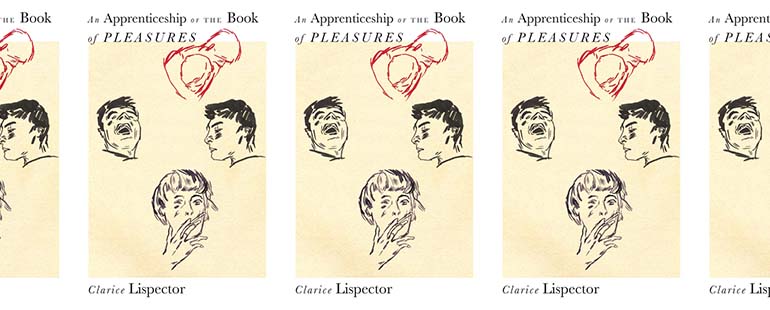An Apprenticeship or The Book of Pleasures and the Limits of Intimacy

As a reader, I resist so-called transcendent writing that bifurcates body and soul. Genuine presence resists binaries and embraces paradox; it is a process of both/and. One will find the ambiguous qualities of transcendence present wherever there is life. My understanding of what grants something the attributes of life relies heavily on author and psychologist Esther Perel’s definition of “eroticism.” In Mating in Captivity: Unlocking Erotic Intelligence (2006), she writes, “I define eroticism, not through the narrow definition of sex that modernity has assigned to it, but the mystical sense: a quality of aliveness, a radiance.”
This “mystical” quality of “aliveness, a radiance” hums throughout Clarice Lispector’s 1968 novel, An Apprenticeship or The Book of Pleasures, re-released earlier this year in translation from the original Portuguese by Stefan Tobler, which details the story of a schoolteacher called Lorí and her relationship with a professor of philosophy, Ulisses. Lispector soothes and excites the reader through variation, inversion, and extension, writing in a manner that is both erotic and illuminating, and difficult to translate. Consider the first part of the opening sentence, which begins the novel unlike any other opening I’ve encountered:
, being so busy, she’d just come from the grocery shopping that the maid had rushed because she was shirking more every day, though she only came in to get lunch and dinner ready, she’d dealt with a few things on the phone, including one awfully difficult call to the plumber, she’d gone to the kitchen to put away the groceries and place the apples, which were her best food, in the fruit bowl, despite not knowing how to arrange fruit, but Ulisses had hinted at the future possibility for example making the fruit bowl look pretty . . .
This sequence is captivating and mysterious because is it both hesitant and overwhelming. Lispector uses the comma to elide the subject and in effect, the sequence reads as “[blank] being so busy.” An absence is being busy on the page; a deluge of racing thoughts belonging to a hesitancy begins the novel.
To emphasize this absent presence, Lispector uses third-person limited narration. This distances the reader from the speaker while simultaneously inhabiting the speaker’s interior. Lispector writes: “ . . . amidst the pretending she needed to speak the truth of an opaque stone so it could contrast with the glinting green pretending, pretends that she loves and is loved, pretends she doesn’t need to die of longing, pretends she’s lying in the transparent palm of the hand of God, not Lorí but her secret name that for the time being she still can’t enjoy . . .” As a reader, I’m privy to Lorí’s inner life, but only partially. In this sequence the narrator outlines Lorí’s deepest desires (these are differentiated as “glinting green”) by naming what she pretends: “that she loves and is love,” that “she doesn’t need to die of longing,” that “she’s lying in the transparent palm of the hand of God.” Some elements, however, are withheld: “the truth of an opaque stone,” “her secret name that for the time being she still can’t enjoy.” Lispector’s elegant variation of withholding and disclosure amplifies tension. It’s erotic, explosive.
In his essay “Muscularity And Eros: On Syntax,” Carl Phillips writes: “As with eros, the first aim is to get another’s attention; after that, there’s the business of sustaining attention, which can mean providing enough mystery to arouse curiosity, but not so much mystery that curiosity gets displaced, instead, by frustration.” Here, Phillips points out that variation between disclosure and secrecy captivates a reader’s attention. What distinguishes Lispector’s opening is that she grabs the reader’s attention not with dramatic action, but with a noticeable absence. Opening with hesitancy, as indicated by a comma, Lispector disrupts convention. Next, she sustains the reader’s attention by withholding essential information while she reveals private details about Lorí’s interior world. Lispector also categorizes Lorí’s fantasies: some are obscured, others are vivid and glimmering. The variation is enough to arouse curiosity and displace frustration. As Phillip’s essay would suppose, the writing is erotic.
Esther Perel would agree. In Mating in Captivity, Perel reveals, “I am not convinced that unrestrained disclosure—the ability to speak the truth and not hide anything—necessarily fosters a robust intimacy.” She elaborates, “Deprived of enigma, intimacy becomes cruel when it excludes any possibility of discovery. Where there is nothing left to hide, there is nothing left to seek. Fusion replaces intimacy, and possession co-opts love.” By contrast, Lispector utilizes Perel’s framework for nurturing a robust intimacy.
Though I’m exploring the novel at the level of the line, at this point it’s vital to offer some discussion on plot and scenario. The character’s actions, or in this instance, inactions, match the way Lispector uses language throughout her novel. As the narrator withholds and discloses, so goes Lorí: she meets and retreats from Ulisses. Lorí vows to resist Ulisses’s romantic appeals and he promises to be patient. Each character practices or avoids their intimate relationship as an inquiry into the contours of pleasure, being, and vitality.
About halfway through the novel, Lispector raises the stakes. We read “a great step had been taken in this apprenticeship.” It is then that Lorí, after this particularly charged encounter with Ulisses, vows to avoid him. The narrator shares: “Ah, thousands of people don’t have the nerve to linger a while longer in this unknown thing which is feeling happy and they prefer mediocrity. She said goodbye to Ulisses almost in a run: he was the danger.” Lorí has, in conversation, disclosed “her soul” and immediately withdraws. Ulisses’s sight of her truest self is exhilarating, but simultaneously threatening. To his credit, Ulisses does not demand Lorí stay—as Perel writes, “intimacy becomes cruel when it excludes the possibility of discovery.” Paradoxically, Lorí’s retreat makes self-discovery possible and thus opens a space for true intimacy. The narrator describes the feeling Ulisses and Lorí share as “infinite, like the waves of the sea.”
As Lorí retreats from Ulisses, however, she cannot return to the person she was before the encounter. As a result, she stays awake all night and in the morning walks along the beach and into the sea. The vivid description of Lorí’s encounter with the water is potent and erotic. Lispector’s unusual syntax (it’s important to note here that Portuguese does not share the same syntactical structure as English) is enigmatic. The object of the sentence persistently shifts:
And now she’s alert, even without thinking, as a fisherman is alert without thinking. The woman is now a compact and a light and a sharp one—and heads through the iciness that, liquid, resists her, and yet lets her enter, as in love where resistance can be a secret request.
Walking slowly her secret courage grows—and suddenly she lets herself be covered by the first wave! The salt, the iodine, all the liquid leave her for a moment blind, dripping—standing shocked, fertilized.
Preceding this passage, Lorí deeply inhales the sea air—and this invigorates her: “And now she’s alert, even without thinking, as a fisherman is alert without thinking.” As the sentence begins, it is Lori who is alert, but the sentence culminates with the image of the fisherman. The “And” is especially crucial to this inversion. Since Lispector does not attribute a causal relationship between Lorí’s alert state and the sea air—she merely places them alongside one another—what is most significant is not how Lorí is acting, but rather how the quality of alertness acts upon Lorí. Lorí’s stance is receptive, not active.
Lispector supplies nouns as description in this passage too. “The woman is now a compact and a light and a sharp one,” she writes. Lorí is not compact; she is a compact. She is not light, but a light—“a sharp one.” And she is dislocated, shifting from “the woman” to a “one.” I find this unusual formulation breathtaking, and in trying to figure out why, I was again struck by Perel’s insight: “When there is nothing left to hide, there is nothing left to seek.” In this scene, what is so striking is Lorí’s disappearance. Paradoxically, Lorí is most hidden when she is most open: “and heads through the iciness, that, liquid, resists her and yet lets her enter, as in love where resistance can be a secret request.”
The sea resists, but it does not refuse. Resistance is a secret request, not a coercive demand. The liquid then, the great mysterious sea, is what both yields to and pushes against Lorí’s physical form. Perel writes that intimacy requires boundaries. There must be a clear place where I am and the lover is not; restraint acts as a source of erotic life. This is like the boundary between the sea and Lori, its icy mystery and her “one.” Perel writes:
. . . in the course of establishing security, many couples confuse love with merging. This mix-up is a bad omen for sex. To sustain an élan toward the other, there must be a synapse to cross. Eroticism requires separateness. In other words, eroticism thrives in the space between the self and the other. In order to commune with the one we love, we must be able to tolerate this void and its pall of uncertainties.
Lori does not control the sea, and it does not control her. There is no covert surveillance of or total fusion with the water. As Lorí maintains a separateness, and a hiddenness, even amid her submersion, “her secret courage grows.” There’s that word again, “secret.” She “lets herself be covered”—and here’s another inversion. It’s not the wave that covers her; Lorí allows herself to be covered.
As stated earlier, Lorí’s stance is receptive, not active. But paradoxically, this receptive stance maintains her independence. She is obscured, secretive. She allows the sea, the sea makes space for her, and she, in return, allows its waves to overwhelm her: “the salt, the iodine, all the liquid leave her for a moment blind, dripping—standing shocked, fertilized.” For Lorí, “all the liquid leave her for a moment blind.” What is this moment if not the “pall of uncertainties” necessary to sustain Lorí’s élan? Notice again the syntactical inversion. Rather than, say, “the liquid blinds her” the text reads: “all the liquid”—a singular noun—“leave”—a plural verb—“her for a moment blind.” Given the sentence structure, the phrase is segmented in two. Although technically Lorí is the object of the sentence in Lispector’s formulation, the effect of this segmentation emphasizes Lorí as a person apart from “all” the liquid, the sea.
The unusual verb-noun pairing, too, emphasizes the “all,” rather than “the liquid.” Given the verb tense though the liquid acts as a noun, in some ways the configuration uses “the liquid” to describe “all.” If “the liquid” is omitted, the sentence reads, “all leave her for a moment blind.” On the other hand, if “all” is omitted, then the sentence appears as, “the liquid leave her for a moment”—“leave” would need to be written as “leaves.” In effect, then, Lispector’s narrator contrasts the all-ness of the liquid, the salt, the iodine with the compact, light, sharp, and one-ness of Lorí. This sequence echoes and reincorporates Lorí’s earlier soul-baring premonition: “one day it will be the world with its haughty impersonality versus my extreme individuality as a person, but we’ll be one and the same.”
Lispector’s uncanny ability to disrupt expectations and pique the reader’s interest stems from a fluidity between disclosing and withdrawal. She dislocates the subject and inverts syntax, resulting in an unusual combination: a kind of receptive agency or yielding independence. Abrupt shifts occur, patterns are broken, and this texture emphasizes that, indeed, there exists a “synapse to cross.” The prose both describes and acts out the erotic. There is mystery, there is individuality, and these commune with uncertainty rather than total security. Above all, one senses that Lispector’s writing—that Lorí’s project—is not driven by reason or mastery. Its driving force is pleasure.



